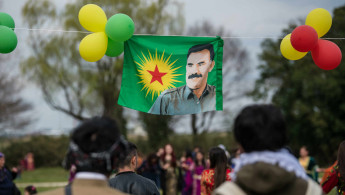Three thousand prisoners on hunger strike in Turkey
The number of prisoners who have joined a hunger strike to protest the isolation in jail of Kurdish rebel leader Abdullah Ocalan has increased to close to 3,000, a human rights group said Tuesday.
A total of 2,983 people in 90 prisons across Turkey are refusing food in protest of jail conditions for Ocalan, according to Human Rights Association head Ozturk Turkdogan. Ocalan's family members and lawyers have reportedly been denied visits.
Pro-Kurdish legislator Leyla Guven launched the hunger strike from prison in November. She has since been released under judicial supervision and is continuing the strike at home.
May 8 will mark six months since the start of her hunger strike - in which she has consumed only sugared or salted water.
Two former pro-Kurdish legislators are among the thousands of prisoners who have joined Guven's strike over the following months.
Hunger strikers in Turkey traditionally refuse food but take vitamins and salt and sugar solutions, which help prolong life.
Turkdogan said 15 of the hunger strikers are now also refusing vitamins.
The strike is in support of Ocalan, the leader of the outlawed Kurdistan Workers Party, or PKK, who has been serving a life prison term on Imrali island, near Istanbul, since 1999. His group is considered a terror organization by Turkey and its western allies.
"For Turkey, the PKK's terrorist designation related to its atrocious conduct of a war it began in 1984 against the Turkish state, which intended to separate the Kurdish-majority areas of southeast. Human rights groups documented the PKK committing crimes against humanity, targeted against other Kurds in many cases," wrote Kyle Orton in his piece for The New Arab.
Ocalan was caught in Kenya outside the Greek embassy in Nairobi in February 1999 by Turkish secret service agents after attempting to seek asylum in Europe.
The European Court of Human Rights ruled in 2005 that Turkey had violated several articles of the European Convention of Human Rights in their treatment of Ocalan during his imprisonment.
Turkdogan's group says Ocalan has not seen his lawyers
since 2011 while pro-Kurdish legislators last visited him in 2015. His brother was allowed a half-hour visit on January 12 - the first visit in two years.
Ocalan has in the past conveyed messages to his rebel group through his lawyers.
Hundreds of Kurdish inmates ended a similar hunger strike in 2012, heeding a call by Ocalan.
Turkish authorities have not commented publicly on the hunger strikes.
Follow us on Twitter: @The_NewArab





 Follow the Middle East's top stories in English at The New Arab on Google News
Follow the Middle East's top stories in English at The New Arab on Google News
![Netanyahu furiously denounced the ICC [Getty]](/sites/default/files/styles/image_330x185/public/2024-11/GettyImages-2169352575.jpg?h=199d8c1f&itok=-vRiruf5)
![Both Hamas and the Palestinian Authority welcomed the ICC arrest warrants [Getty]](/sites/default/files/styles/image_330x185/public/2024-11/GettyImages-2178351173.jpg?h=199d8c1f&itok=TV858iVg)
